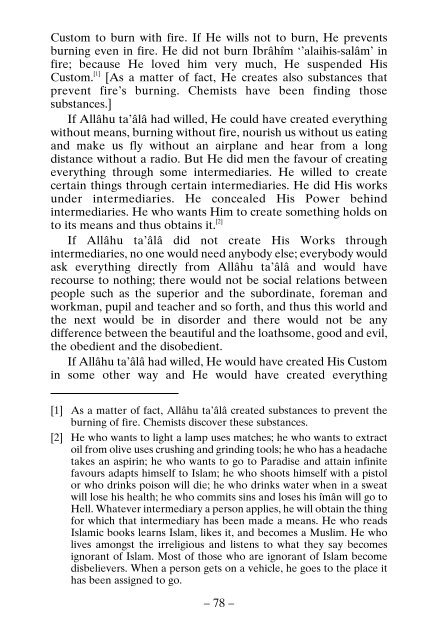Belief and Islam
BELIEF AND ISLAM star This work, Belief and Islam, originally was written in Persian under the title I’tiqâd-nâma by Hadrât Mawlânâ Khâlid al-Baghdâdî, a profound ‘âlim of Islam and a specialist in ma’ârif of tasawwuf. Hâji Faydullah Effendi of Kemah, a khalîfa of great walî Mavlânâ Mahmûd Sâhib, the brother of the author, translated the book into Turkish and named it Farâid-ul-fawâid which was printed in Istanbul in 1312 A.H.[1894]. Our bookstore had it translated again from the Persian original into Turkish and, some explanations and three chapters, published it with the title Imân ve Islâm in 1966. German, French and Arabic versions are also published by our bookstore. This book, explains five fundamentals of Islam, six fundamentals of îmân and the contemporary information about the matter and refutes those who are against Islam and those who are lâ-madbhabî.
BELIEF AND ISLAM
star This work, Belief and Islam, originally was written in Persian under the title I’tiqâd-nâma by Hadrât Mawlânâ Khâlid al-Baghdâdî, a profound ‘âlim of Islam and a specialist in ma’ârif of tasawwuf. Hâji Faydullah Effendi of Kemah, a khalîfa of great walî Mavlânâ Mahmûd Sâhib, the brother of the author, translated the book into Turkish and named it Farâid-ul-fawâid which was printed in Istanbul in 1312 A.H.[1894]. Our bookstore had it translated again from the Persian original into Turkish and, some explanations and three chapters, published it with the title Imân ve Islâm in 1966. German, French and Arabic versions are also published by our bookstore. This book, explains five fundamentals of Islam, six fundamentals of îmân and the contemporary information about the matter and refutes those who are against Islam and those who are lâ-madbhabî.
Create successful ePaper yourself
Turn your PDF publications into a flip-book with our unique Google optimized e-Paper software.
Custom to burn with fire. If He wills not to burn, He prevents<br />
burning even in fire. He did not burn Ibrâhîm ‘’alaihis-salâm’ in<br />
fire; because He loved him very much, He suspended His<br />
Custom. [1]<br />
[As a matter of fact, He creates also substances that<br />
prevent fire’s burning. Chemists have been finding those<br />
substances.]<br />
If Allâhu ta’âlâ had willed, He could have created everything<br />
without means, burning without fire, nourish us without us eating<br />
<strong>and</strong> make us fly without an airplane <strong>and</strong> hear from a long<br />
distance without a radio. But He did men the favour of creating<br />
everything through some intermediaries. He willed to create<br />
certain things through certain intermediaries. He did His works<br />
under intermediaries. He concealed His Power behind<br />
intermediaries. He who wants Him to create something holds on<br />
to its means <strong>and</strong> thus obtains it. [2]<br />
If Allâhu ta’âlâ did not create His Works through<br />
intermediaries, no one would need anybody else; everybody would<br />
ask everything directly from Allâhu ta’âlâ <strong>and</strong> would have<br />
recourse to nothing; there would not be social relations between<br />
people such as the superior <strong>and</strong> the subordinate, foreman <strong>and</strong><br />
workman, pupil <strong>and</strong> teacher <strong>and</strong> so forth, <strong>and</strong> thus this world <strong>and</strong><br />
the next would be in disorder <strong>and</strong> there would not be any<br />
difference between the beautiful <strong>and</strong> the loathsome, good <strong>and</strong> evil,<br />
the obedient <strong>and</strong> the disobedient.<br />
If Allâhu ta’âlâ had willed, He would have created His Custom<br />
in some other way <strong>and</strong> He would have created everything<br />
[1] As a matter of fact, Allâhu ta’âlâ created substances to prevent the<br />
burning of fire. Chemists discover these substances.<br />
[2] He who wants to light a lamp uses matches; he who wants to extract<br />
oil from olive uses crushing <strong>and</strong> grinding tools; he who has a headache<br />
takes an aspirin; he who wants to go to Paradise <strong>and</strong> attain infinite<br />
favours adapts himself to <strong>Islam</strong>; he who shoots himself with a pistol<br />
or who drinks poison will die; he who drinks water when in a sweat<br />
will lose his health; he who commits sins <strong>and</strong> loses his îmân will go to<br />
Hell. Whatever intermediary a person applies, he will obtain the thing<br />
for which that intermediary has been made a means. He who reads<br />
<strong>Islam</strong>ic books learns <strong>Islam</strong>, likes it, <strong>and</strong> becomes a Muslim. He who<br />
lives amongst the irreligious <strong>and</strong> listens to what they say becomes<br />
ignorant of <strong>Islam</strong>. Most of those who are ignorant of <strong>Islam</strong> become<br />
disbelievers. When a person gets on a vehicle, he goes to the place it<br />
has been assigned to go.<br />
– 78 –

















